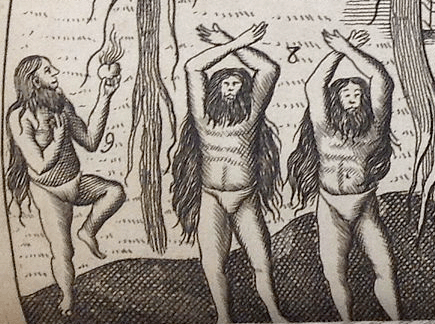(This is the fourth in a series of excerpts from From the Gita to the Grail: Exploring Yoga Stories and Western Myths by Bernie Clark. The previous excerpt is here.)
While brahmins were ceded the top level within the varna system within India, these priests were not considered the heroes of their myths. Varna is the word used to describe what is commonly called the caste system in India. Varna means color, but not the color of the skin. Color here referred to the color of one’s soul. There are six colors that can pour into a soul: black, grey, blue, red, yellow and white. Black is the least favorable color and white the most refined and desired. These colors refer to the karmic state of one’s soul.
The heroes of the old stories were not the brahmins, as just mentioned, they were the rishis: the ancient seers and prototypical yogis. They are somewhat equivalent to Old Testament prophets and had much in common with earlier tribal shamans. The rishis were the ones who mediated between the gods and the human race, between the world that we ordinarily experience and that which is unseen and powerful. These early yogis, like their shaman predecessors, gained their tremendous powers and insight through their tapas. Tapas is the heat or energy that develops through ascetic practices and severe austerities – basically through yoga (but not the yoga of the West today.) If a yogi gained enough tapas, he could control the universe and overthrow even the great gods in heaven, including Indra, as this story tells:
~
Vikra was a great yogi: his tapas came from holding one arm up in the air. This is not an easy practice. Many of his fellow yogis would stand in a pose known as the tree posture: simply standing on one leg, hands in prayer at the heart centre. The tree is not a particularly challenging pose, so to increase their tapas these yogis would stand for eight hours at a time…on top of an ant hill…covered in honey…under the hot mid-day sun. This is how you build tapas.
Vikra’s yoga was simple, but effective: keeping his arm raised over his head was hard for the first few days, but after a few weeks the arm felt lighter. After a few years, he didn’t notice his arm anymore and he couldn’t lower it again even if he wanted to, since it had become fused in that position. That was a small price to pay for the power he was accumulating. Soon he would have enough power to overthrow Indra himself, a fact that did not escape Indra’s notice.
Indra went to the great god Shiva: “Something has to be done about Vikra! If we allow him to continue with his yoga, he will be too strong.” Shiva agreed to pay a visit to Vikra and see what could be done. In the past Shiva and other gods could easily dissipate a yogi’s great tapas by sending a beautiful woman to distract him. Once lovemaking was complete the yogi’s powers were gone: he would have to start all over again. Shiva knew that Vikra was not going to fall for that old trick. He would have to do the only thing that was guaranteed to disperse Vikra’s tapas: he would have to grant him a wish.
“Hey, Vikra!” said Shiva as he manifested in front of the great yogi. “What’s up?”
“My arm!” replied Vikra, pointing proudly to the withered limb.
“Yes, I can see that,” said Shiva, “So…tell me, what do you want?”
“I want,” said Vikra excitedly…his efforts were about to bear fruit! Finally, after years of practice he was going to fulfill his mission in life. This was a mission that many other priests and gods longed for, but were unable to accomplish: Vikra wanted to kill Shiva! “I want…the power to kill anything that I touch on the head!”
“Is that all?” said Shiva. “Piece of cake.”
With a snap of Shiva’s fingers there was a show of pyrotechnics worthy of the Wizard of Oz, with smoke and lights, and a sound like thunder that ended with a small “poof!” Vikra felt the change: he felt the power within him and immediately he lunged towards Shiva. Shiva suddenly realized that he was in danger: he ducked and dodged, but Vikra kept coming. Shiva fled; Vikra followed.
In desperation Shiva ran towards Vishnu, the Preserver. Vishnu raised both hands and bade Shiva to stop running. “What’s going on?” he asked. Shiva quickly filled him in and as he finished the recap, up ran Vikra. Vishnu told Shiva, “Stand behind me.”
Shiva did as told, but was still not safe: Vikra tried to reach around Vishnu’s great body to touch Shiva.
“Vikra, what are you doing?” inquired Vishnu.
“Well,” came the reply, “I now have a great power, the power to kill anything that I touch on the head and I am going to kill Shiva!”
“Wow,” said Vishnu, “that is quite a power—how did you get it?”
“From Shiva!”
“From Shiva?” asked Vishnu in surprise. “You know what a kidder Shiva is—how do you know that you actually have this power; that it works? Have you tried it yet?”
“No,” said Vikra pausing to reflect.
“Well,” offered Vishnu, “don’t you think you should test it? Why not touch yourself on the head and see what happens!”
Vikra thought that was a good idea, so he did. He touched himself on the head … and he died. Thus did Vishnu save Shiva.
~
This tale is illuminating on many levels: firstly, it was told by followers of Vishnu and these Vaishnavites love to poke fun at the Shavites, the followers of Shiva. One of the functions of mythology is aetiological: it explains the way certain things are; and if you believe that Vishnu is greater than Shiva, this myth reinforces your belief. Secondly, this story illustrates the power that can be gained through yoga. Yoga builds tapas and through this heat magical powers can be obtained. Thirdly, it illustrates the fact that what has been known as yoga throughout the ages cannot be bound to one form of practice or one particular kind of intention: there are many yogas with many quite different intentions. The story also points out that Shiva was not a god beloved by all. The final point in relating this story is to, of course, demonstrate that it is through these yogis that communion with the gods occurs.
The brahmins, both human or divine, are not heroes (there are gods who are brahmins too); they are the beneficiaries of the knowledge gained and passed down to them by the rishis. It was through the rishis that knowledge of the Vedas was revealed. Shruti means heard or revealed. The Vedas were shruti: no one sat down to write the Vedas. It was in the extraordinary states of supreme concentration that the yogis heard the words of the gods and through shruti the truths of the universe were learned. This is very similar to the way Mohammed had the word of Allah revealed to him while he prayed in his cave. Literature, on the other hand, was smriti or remembered: the stories and myths of the common people were not revealed truth – only the brahmins and certain kshatriyas were privy to the most esoteric teaching. For the vaisya, the commoners, there were the puranas: the myths, folk tales and epics recited by bards, not priests.
Love elephant and want to go steady?
Sign up for our (curated) daily and weekly newsletters!
Editor: Travis May
Photo: Wiki Commons









Read 0 comments and reply